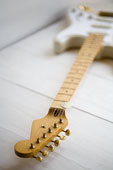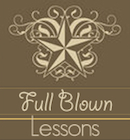I often get asked about my guitar sound and how I get it.
Guitar sound is a funny thing. It’s a personal thing that (in my opinion) is attached to a player.
In other words, it’s never just the instrument or amplification at hand –but also what the player brings out. I’ll try to explain.
As a dedicated player, I know where the weak spots are in my rig. When I say weak spots, this could mean a number of things. For myself, I’ll refer to sustain on a note. I know where I get more sustain whenever I am playing live. When I want a note to “sing” longer without having to keep picking it, I’ll go to the hot spot on the stage. I know the hot spot on the stage because I find it when doing “sound checks”.
“Hot Spot” is the place I can go as I approach my amplifier and get a nice warm feedback (not a screeching high note that offends). This sort of feedback can be heard on many Boston songs. Neil Schon (of Journey) is a pro at this as well. He now has a sustainer on his guitars that allows either a low or high octave feedback. Very nice.
This is just one example of the player being attached to the sound. I might pick up Neal Schon’s guitar and sound like rubbish when I play. I doubt it because I’ve been playing long enough to recognize the type of tones that fit my playing style. I believe I could work with Neil’s rig. There are players out there that I wouldn’t feel “seated” using their setups.
Watch this video of Neal as he shows…
SIDE NOTE… I’m willing to try if you want to contact me Neal.
Over the years, I’ve learned to simplify. I’m not playing in any huge arenas (but I will if you want to book me or have me “sit in” –Hey Neil!). In the process of simplifying, I’ve learned to get a big sound out of a small setup.
My primary rig is a Fender Princeton Chorus Amplifier. Guitars are always optional but for the past few years, I’ve been leaning on my Strat. Effects are minimal with a little chorus, delay, and overdrive to whatever fits.
I love the Fender Princeton Chorus amplifier. My wife bought it for me twenty years ago and it’s still going strong. When I play live, I use it in a way that would see strange to some folks. I’ll tell you more about this in another post.
For now, just remember your sound truly becomes your sound.
I have picked out a few things that I know will help you get very close to all my tones and sound blow. You can spin the wheel below and see some things I’ve suggested. Hope this helps you!
~ Jerry
I’ve found these to be some of THE BEST PRICES from a reliable resource on the web!

